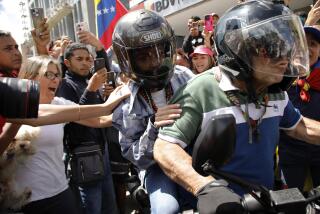Opponents Threaten Chavez With Recall Vote
- Share via
BOGOTA, Colombia — Today is supposed to mark the beginning of the end for Hugo Chavez’s rule as Venezuela’s controversial president. At least his political adversaries hope so.
The opposition says it has already collected more than enough signatures to force a recall election, a process the constitution allows to start today, halfway through Chavez’s term. It has set up campaign headquarters and touts polls purportedly showing that his defeat is imminent. A march is planned for Wednesday.
In Venezuela, chaos often reigns and politics is a contact sport. The only thing certain is that one of the United States’ largest oil suppliers is set to plunge into another period of political turmoil.
“For sure, there’s going to be a recall -- in the United States,” Chavez said in a recent speech, brushing off the possibility of a recall aimed at him with a joke about California’s upcoming vote.
The president’s opponents claim that the recall is only a matter of time -- with some saying it could happen as soon as November but most predicting it will happen early next year. They note that the United States has strongly backed such an election and the Venezuelan leader agreed to allow a recall to proceed in a pact he made with the opposition earlier this year.
“I am absolutely convinced that it will happen,” said Enrique Mendoza, the popular governor of Miranda state and a leading candidate to replace Chavez. “The recall referendum does not belong to any political party or individual, it doesn’t depend on whether the president wants it or not.... The referendum is an instrument of the people.”
The battle will begin in earnest Wednesday, when the opposition plans to deliver about 2.8 million signatures demanding the recall -- far more than the 20% of registered voters required.
The problem is, Chavez and his supporters have already dismissed the validity of the signatures, which were collected in February, during an opposition strike.
Yet another problem is that there is nobody to rule on the dispute. The country’s new election council, which is supposed to decide all questions related to the ballot process, still has no members. Chavez backers and adversaries in the National Assembly could not agree on candidates, so the Supreme Court must appoint the members.
Their decision is due Sunday, and nobody is sure how they will rule. It is also unclear who might be appointed and whether the appointments will be challenged.
Even if the membership is established, it is unclear how soon the council will be operational. Theoretically, the panel would have 60 days to hold the recall election if it determined that the petition was valid.
“There are going to be a series of political crises,” said Larry Birns, executive director of the Council on Hemispheric Affairs. “As each step unfolds, there will be questions about whether a referendum will actually take place.”
If Venezuela’s recent political history is a guide, the next several months hold out little hope of healing this deeply divided society with a wounded economy.
The opposition arose after Chavez imposed a series of laws -- including a controversial land reform act -- using emergency powers granted to him in 2001. Its leaders have accused him of driving Venezuela to ruin through his “Bolivarian revolution” -- an ill-defined plan to help the country’s millions of poor.
Opposition strikes led to a coup in April 2002 that briefly toppled Chavez, a former paratrooper who led a failed coup of his own in 1992. Chavez returned to power 48 hours later with the backing of loyal troops and a massive turnout of his mostly poor supporters.
After a brief period of reconciliation, the two sides clashed again in December and January amid a nationwide strike promoted by the opposition, a mix of businesspeople, union leaders, communists and housewives.
The strike crippled the economy, with gross domestic product plunging 29% between the first quarters of 2002 and 2003. Crime has soared. Unemployment hovers at 20%, and inflation is about 17% per year.
Worse, from the point of view of the opposition, the strike left Chavez more powerful than ever. The military remained firmly on his side, and he retained control of the nation’s contested oil industry, which accounts for half the country’s budget. Depending on the month, Venezuela is usually among the top five suppliers of oil to the United States.
The opposition, never firmly united, crumbled after the strike. Despite a recent proclamation of unity, it has yet to solidify its support behind one candidate as an alternative to Chavez. “The opposition has no command, no leader,” said Fausto Maso, an analyst and radio commentator who would like to see Chavez go. “The referendum is going to be a long political battle.”
Among the serpentine possibilities mentioned is that Chavez could simply resign. The logic is that he would lose a recall -- which would take the form of a vote for or against him -- but if he resigned and an open election followed, he would best his scattered opponents. Polls show he still commands between 30% and 35% support, more than any other candidate.
That has led some analysts to ask if a recall might cause more problems than it would solve.
“It’s a mistake to try to have a recall in order to remove somebody when the elected official is not that unpopular and where the opposition doesn’t have a viable replacement,” said Steve Ellner, a professor of economic history at Venezuela’s University of the East and author of a recent book on the country’s political history. “Things are not easy to predict.”
More to Read
Sign up for Essential California
The most important California stories and recommendations in your inbox every morning.
You may occasionally receive promotional content from the Los Angeles Times.













